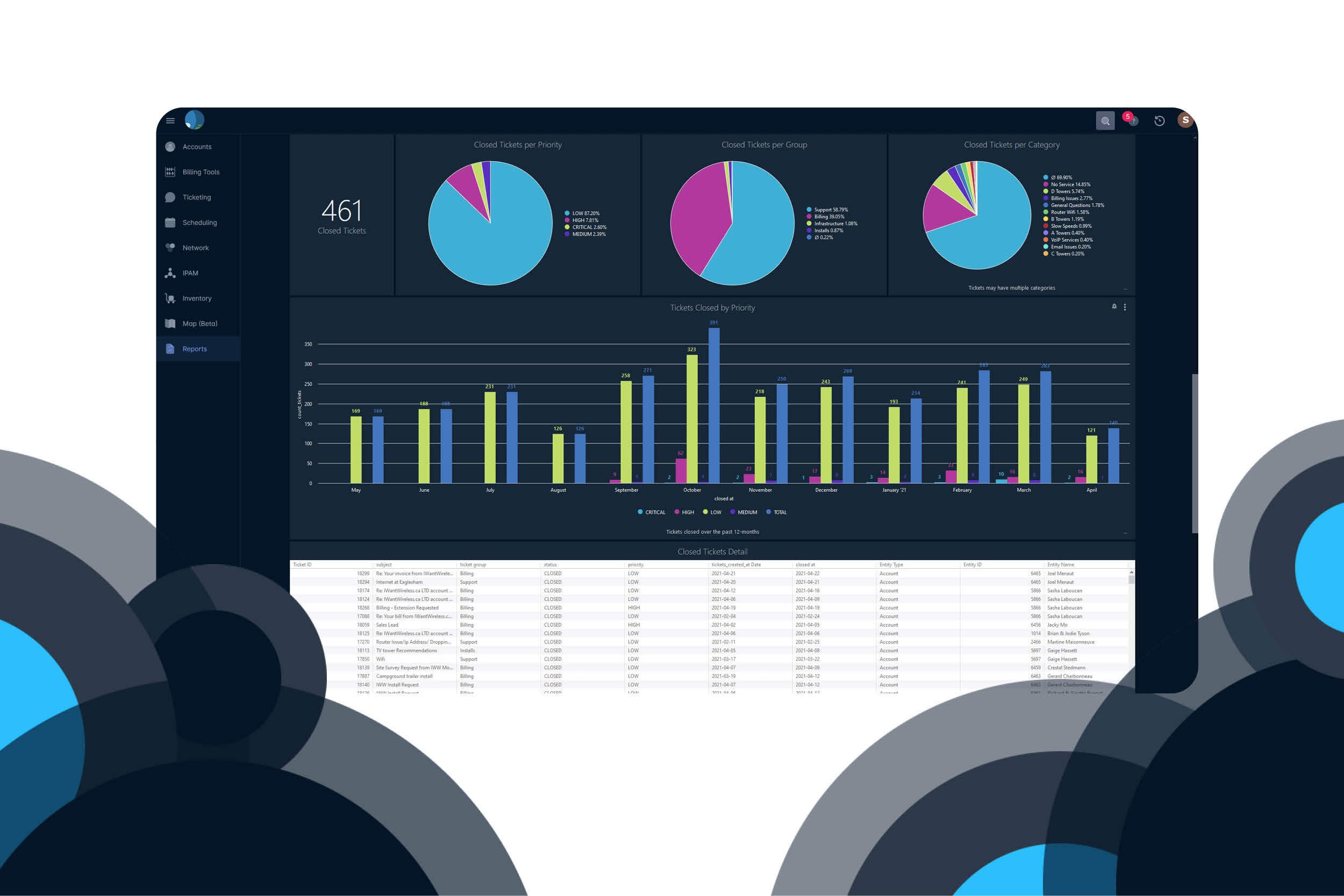4 min read
How to Transform Your Field Operations with a Field Tech Mobile App
With the rapid advancement in technology comes a shorter depreciation period. Combining this with an ever-growing population means that...

3 min read
Taneil Currie : Jan 31, 2024

Field operations managers play an integral role in ensuring an ISP’s success as they oversee field technicians, manage field operations, and improve business efficiency. Gathering data in the field is essential for making informed decisions, improving processes, and achieving successful outcomes. Tracking and understanding the data collected will help to plan and budget for future operations, track progress and measure the effectiveness of current activities.
Accurate data provides field operations managers with valuable insights into their field operations, enabling them to identify strengths, weaknesses, and areas for improvement. A powerful tool that can assist field operations managers in their efforts is business intelligence reporting. Using business intelligence reporting, field operations managers can gain valuable insights into the performance of their field technicians and make data-driven decisions to improve business productivity.
There are many ways that field operations managers can use business intelligence reporting to enhance the performance of their field technicians and overall business efficiency. Some examples include monitoring and analyzing field technician productivity, tracking job completion times and customer satisfaction, identifying inefficiencies in field processes, and improving dispatch and scheduling. Furthermore, business intelligence reporting can help field operations managers evaluate their field technicians’ training needs, monitor mobile device usage, and improve fleet management.
Field operations managers have access to a wide range of data collection devices and technologies, which enable them to gather large amounts of data in the field. However, gathering high volumes of data from multiple sources can create an issue with data overload and analysis paralysis. Visualizing data is a crucial aspect of business intelligence, as it allows field operations managers to effectively communicate complex information, uncover trends and patterns, and make data-driven decisions.
Let’s look at some business intelligence reports that are useful for field operations managers to track the efficiency and performance of field operations:
An Installation Report provides a detailed record of each internet installation performed by a field technician. The report typically includes information such as the type of equipment installed, the location of the installation, and any challenges faced during the installation process. The purpose of the Installation Report is to provide a clear and concise record of each installation, which can be used for various purposes, including quality control, customer service, and training.
A Troubleshooting Report provides a detailed record of any issues encountered during an installation. The report includes information such as the type of issue, the location of the issue, and the steps taken to resolve the issue. The report can help identify common problems during installations and develop best practices for resolving them. It can also be used to measure the success of troubleshooting initiatives and to identify any areas where improvements can be made. Regularly monitoring and resolving issues during installations, Internet Service Providers can ensure that they provide their customers with the highest level of service possible.

A Time and Attendance Report tracks the working hours and attendance of field technicians. The report typically includes information such as each work shift’s date, start and end time, and any absences or tardiness. A comprehensive overview of field technicians’ attendance and working hours will ensure that they are working within the agreed-upon schedule, which is very useful if you use a third party to fulfill field service work orders. You can use this report to assess each field technician’s attendance and punctuality and identify where improvements can be made.
An Inventory Report tracks the inventory of equipment and supplies used by field technicians. The report includes information such as the quantities on hand, the cost of each item, and any discrepancies in the inventory. The report provides a comprehensive overview of the inventory to ensure sufficient equipment and supplies are available to meet the needs of field technicians. Additionally, you can monitor each item’s cost and identify areas where cost-saving measures can be implemented. By regularly tracking inventory and controlling costs, Internet Service Providers can ensure they use their resources efficiently and effectively.
A Cost Analysis Report is a detailed breakdown of the costs associated with an installation or service repair. The report includes information such as the cost of labor, materials, equipment, and any other expenses incurred during an installation or repair. This report can be used to compare the cost of each installation with previous installations and identify any trends or patterns that emerge. By regularly monitoring the cost of installations and controlling costs, organizations can ensure that they are using their resources efficiently and effectively.
In conclusion, business intelligence reporting provides a wealth of information that can help field operations managers make informed decisions about their field operations. Whether it’s tracking the performance of field technicians, identifying areas for cost savings, or improving the allocation of resources, business intelligence reporting can help field operations managers drive business success. By leveraging business intelligence, field operations managers can ensure that their field technicians are equipped with the tools they need to provide outstanding customer service and achieve business efficiency.
Optimize scheduling, planning, and collaboration with field operations data that matters.
Sonar’s reporting module empowers your dispatch and field technician teams with real-time reporting. Measure and track average handle times across geographic locations, job types, or dispatch times. Streamline field tech operations and identify trends across your network to see failed installs, defective hardware, and more. Schedule a demo and see how Sonar can help you turn data into actionable insights.

4 min read
With the rapid advancement in technology comes a shorter depreciation period. Combining this with an ever-growing population means that...

1 min read
As a Fiber Internet Service Provider, it is imperative to stay up-to-date on your company’s key performance indicators (KPIs), which serve as...

Field service dispatch software is essential for managing field service operations as it helps overcome various challenges faced by Internet...